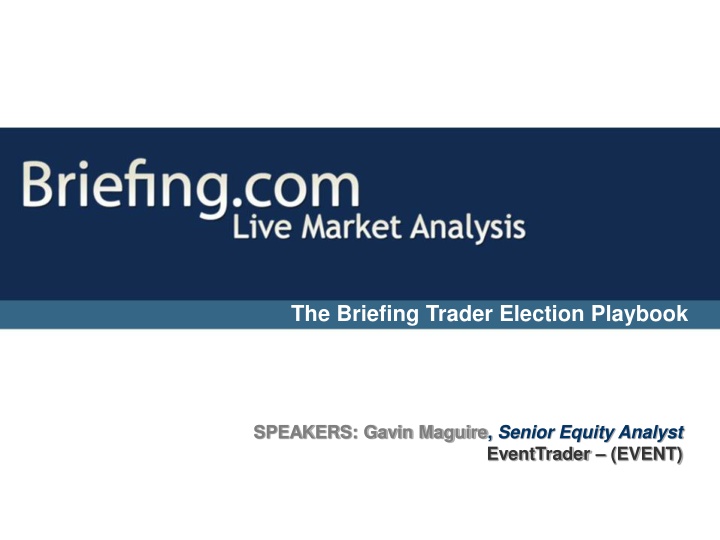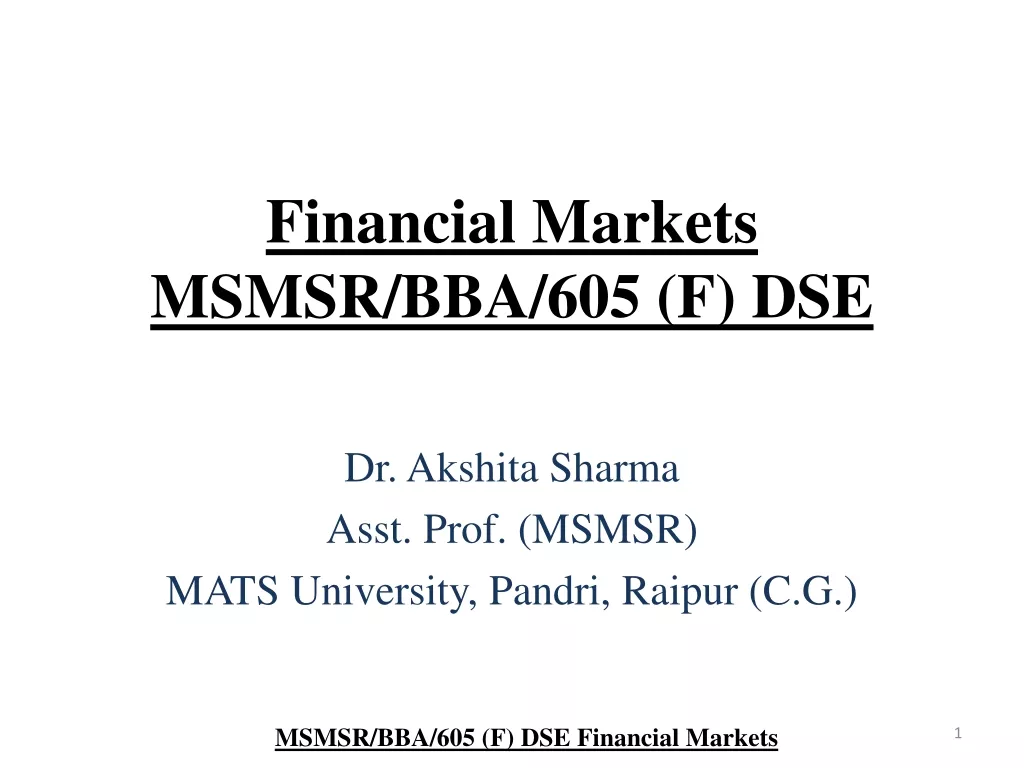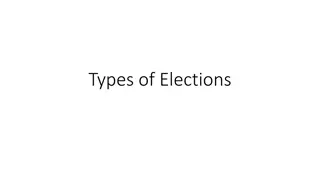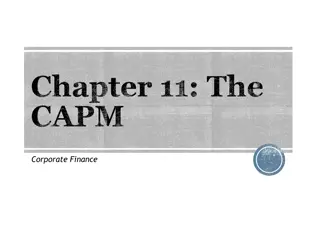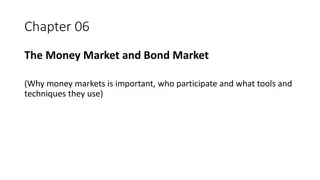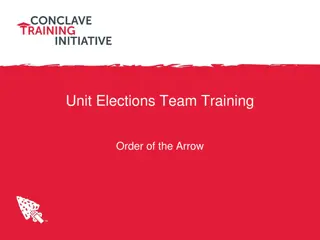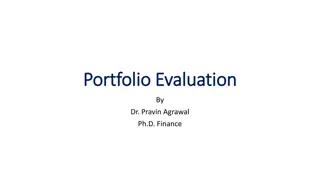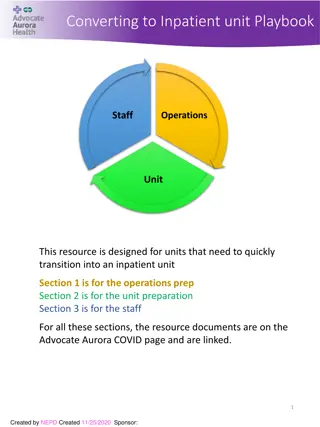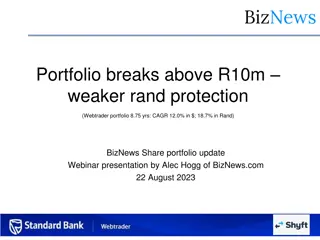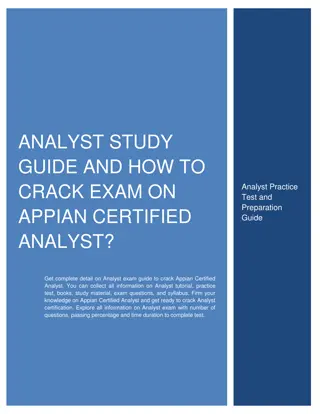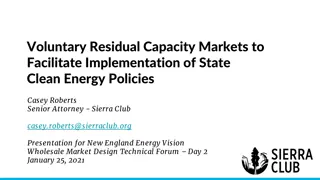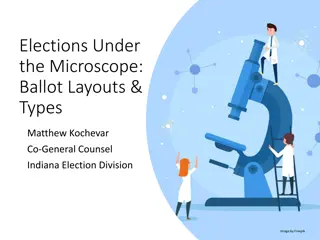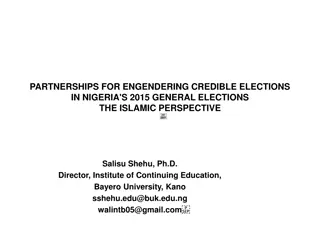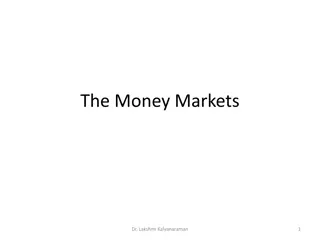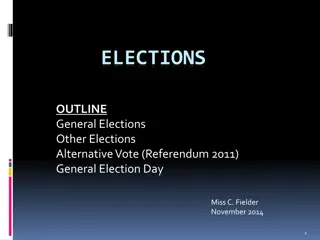Insights on Elections, Markets, and Your Portfolio: An Analyst's Playbook
Explore the historical impact of elections on portfolios, economic policies, and market uncertainties. Gain valuable insights on election cycles, market trends during election years, correlations between elections and recessions, and historical market performance based on different presidential terms. Understand the potential influences of elections on various aspects of the economy and make informed decisions for your investment strategies.
Download Presentation

Please find below an Image/Link to download the presentation.
The content on the website is provided AS IS for your information and personal use only. It may not be sold, licensed, or shared on other websites without obtaining consent from the author.If you encounter any issues during the download, it is possible that the publisher has removed the file from their server.
You are allowed to download the files provided on this website for personal or commercial use, subject to the condition that they are used lawfully. All files are the property of their respective owners.
The content on the website is provided AS IS for your information and personal use only. It may not be sold, licensed, or shared on other websites without obtaining consent from the author.
E N D
Presentation Transcript
The Briefing Trader Election Playbook SPEAKERS: Gavin Maguire, Senior Equity Analyst EventTrader (EVENT)
Introduction Looking at the elections and the impact on your portfolio. - Historical moves around elections - Candidates and the Platforms - Verticals - Plays Gavin Maguire- EVENT Trader (EVENT)
Election Cycles Presidential, Parliamentary, and Legislative elections create uncertainty: Economy (Policies, Trade, etc) Markets (Regulations, Capital Gain Taxes) Social (Taxes, Healthcare, Judicial System) Gavin Maguire- Event Trader (EVENT)
Markets During Election Years We are pattern seekers, believers in a coherent world, in which regularities appear not by accident but as a result of mechanical causality or someone s intention when we detect what appears to be a rule, we quickly reject the idea that the process is truly random - Daniel Kahneman, psychologist and Nobel Laureate Generally speaking stocks struggle in 1H of the year due to uncertainty Markets usually find a bottom once a clear cut winner emerges. 2016 has seen some similarities but is trading to the economy, global issues, and monetary policy. One pattern that did stick out- The three month return in markets ahead of the election has predicted 19 of the 22 outcomes since 1928 (S&P at 2174 on August 1). Gavin Maguire- Event Trader (EVENT)
Elections and Recessions Last recession was December of 2007 Since 1854 the U.S. has never gone three elections without a recession. There have been 14 recessions since 1928 11 (79%) have started after elections Median avg 8 months Mean 8.4 months Gavin Maguire- Event Trader (EVENT)
Elections and Markets Dow Jones has ended higher in 15 of last 21 Presidential terms (Dec after election thru Nov of election). Three of the six declines include Hoover (Great Depression), Carter (Oil Crisis), Bush 43 (Great Recession). Dollar has been in a downward trend since 1985. Since Bretton Woods 7 of 10 terms have seen Gold go higher (Reagan 1st, Bush 41, Clinton 2nd). Silver has followed same pattern as gold. Oil prices have been higher in 80% of terms (JFK/LBJ, both Reagan terms which was post oil crisis). Gavin Maguire- Event Trader (EVENT)
Who is better for Markets an the Economy? Historically, whether Republican or Democrat occupies the White House has no statistically significant impact on U.S. equities - Ross Koestrich, head of asset allocation at Blackrock Most studies show quite an advantage for equities following the election of Democrats but a Federal Reserve study concludes there is no consistent relationship for market volatility and test back to 1852 - T. Rowe Price S&P has risen 2/3 of years since 1926 regardless of who is in office. Gavin Maguire- Event Trader (EVENT)
Electoral Votes 270 Electoral Votes are needed and Clinton has an easier path. Trump needs to carry more battleground states: FL, PA, OH, GA, NC, VA, WI, CO, NV, IA, AZ, NH. Ohio- Last Democrat to win w/ out is JFK; No Republican has won w/out it (Trump is up ~2 points). Florida- Last Republican to win w/out was Calvin Coolidge (Clinton up ~3 points). Pennsylvania- Clinton has a 12 point lead. Gavin Maguire- Event Trader (EVENT)
Congress Senate- Thinking is that the president elect s party could take Senate. Democrats need to take 6 seats to gain control. Congress- Likely to stay in Republican control Democrats need to take 30 seats. Baseline scenario is for a balanced outcome that maintains current split in power. Gavin Maguire- Event Trader (EVENT)
Overall Winners If we saw a clean sweep for either party the following would likely benefit: Democrats- Trade, Small Caps, Domestic Stocks, Commodities Republicans- Taxes, Dollar, Bonds, Rates, Global Exposure, Lighter Regulation Regardless- Infrastructure, stock market Gavin Maguire- Event Trader (EVENT)
Clinton vs Trump (Overall) Clinton- Advocating increasing taxes on income (wealthy) and capital and increasing public-private partnerships. Trump- Larger fiscal stimulus, lower taxes on income, capital, and corporations and reducing regulations. On the surface your typical Progressive vs Supply Side arguments. Gavin Maguire- Event Trade (EVENT)
Trump- Winners and Losers Major Winners- Oil & Gas, Aerospace & Defense, Tech & Telecom Services, Materials, Domestic Manufacturing, Multinationals Minor Winners- Pharma/Biotech, Medical Devices, Utilities, Financials Minor Losers- Housing REITs, Muni Bonds Gavin Maguire- Event Trader (EVENT)
Clinton- Winners and Losers Major Winners- Solar, Wind, Materials, Healthcare Facilities & Services Minor Winners- Technical & Telecom, Utilities, Consumer Staples, Aerospace & Defense Minor Losers- Consumer Discretionary, Oil & Gas, MLPs, Student Lenders, Prison Operators, Big Banks Major Losers- Coal, Pharma, Restaurants Gavin Maguire- Event Trader (EVENT)
Infrastructure Both candidates have discussed the need for fiscal stimulus via an increase in infrastructure spend. Differences in how the money would be raised and where it would be spent. Concerns that both could see resistance from Congress. First year of spending under a new administration is an increase of ~5.5% y/y which is generally in line with averages. Gavin Maguire- Event Trader (EVENT)
Infrastructure No evidence of a consistent relationship between Fed spending and equity returns. Mining, services, consultations, and parts would be a 2017 precursor to equipment which would likely see activity in 2018. Fiscal spending tends to be more effective in recessions and made permanent; financed by debt; focused on consumption and investment. Gavin Maguire- Event Trader (EVENT)
Infrastructure Clinton Proposed spending $1.55 trl over 10-years financed through taxes on the wealthy and corporations. Focused on highways, public transit, airports and green energy. Has talked about affordable broadband in every house by 2020. Trump Proposed spending ~$1 trl and reducing spending which leaves the spending gap to be largely financed through Treasury debt. Method of increasing debt could weigh on the dollar and bonds. Cut in taxes and increased spending could steepen yield curve. Gavin Maguire- Event Trader (EVENT)
Capital Gains Taxes- Clinton Increase Federal Capital Gains taxes with a marginal rate of 47.4% After two years of holding investments the rate would decrease. The lowest rate of 20% would be hit on a 6- year hold. Increasing the holding period for longer-term gains to 6 years (currently 1 year). Would likely reduce liquidity. Reduce turnover. Lower shorter term investment appeal of equities.
Capital Gains Taxes- Trump Has not released full details but expectations are for him to lower the rate on capital gains. Would repeal the 3.8% surcharge for the Affordable Care Act. Short-term capital gains taxed at lower margins.
Capital Gains- Tax-related selling Democrats wins- Would likely increase selling to lock in winners. Republicans- Would likely delay selling to capture lower tax rates. Momentum stocks kept under Trump plan, Value Stocks kept under Clinton plan.
Potential Market Impact from Capital Gains Changes The differences could prompt investors to sell winners to lock in the lower tax rate if Clinton wins If Trump wins we could see investors delay selling winners in order to take advantage of a better tax rate in 2017. Momentum stocks would be kept with Trump, sold with Clinton Value stocks could be treated in the opposite fashion.
Buffett Rule Clinton has suggested bringing this rule into play. Idea being that no household that earns over $1 mln should pay less than 30%. Fair Share Surcharge would have additional 4% tax to those making more than $5 mln (top 0.02% of earners)
Corporate Taxes- Clinton Clinton has no plans to change the corporate tax rate. Marginal corporate tax rate is 39% when factoring in State and Local taxes; Effective tax rate is 27% after deductions. Clinton is looking to stop further tax inversion mergers (Currently a bill in Congress) This would be a negative for multinationals with big overseas operations. Corporate Taxes are ~10% of revenue and less than 2% of GDP (Individual taxes much higher part of Fed revenue)
Corporate Taxes- Trump Trump would lower the corporate tax rate to 15% from 35% (President Obama has called for it to be lowered to 27%). Trump would eliminate loopholes and tax exemptions but he has not clearly stated what changes would occur. One time repatriation of 10% of earnings and end deferrals of taxes on foreign owned holdings (Obvious boost for multinationals like AAPL, GOOGL)
Trade Both candidates have expressed that they would like to re-visit trade pacts. This is arguably the biggest concern for markets regardless of who wins. Trump has used anti-trade as a pillar of his campaign and promises to rip up the Trans-Pacific Partnership and NAFTA. Clinton has been supportive of global trade in the past (Supported TPP and Bill Clinton created NAFTA) but took up the anti-trade platform following Bernie Sander s success in the primary. NAFTA is Mexico and Canada. TPP is 12 pacific rim countries and also includes Canada and Mexico. Both candidates have said they would take a tougher stance on China (FXI).
Trade- Cont Protectionism would likely have a negative impact on global trade, cutting into global GDP. Free trade has increased competition and lowered prices, so a move away could prove to be inflationary (Bonds, Gold). Export reliant, particularly Emerging Markets would be hurt (EWW, EWC, EEM) Also for Gold, it could see interest as a potential alternative currency used in trade.
Trade cont Three largest trading partners are China (FXI), Canada (EWC), Mexico (EWW) which make up ~45% of U.S. export and imports Aircraft, Auto, Soybeans, Industrial Machines, Computers and Semiconductors were 49% of U.S. exports to China in 2015. Trump has proposed a 45% tax on China imports and a 35% tax on Mexico autos and parts.
Trade cont Aerospace Largest export industry (gross exports $119 bln in 2015). Asia Pacific has about 1/3 of global travel. China could respond with its own tariffs (13% of exports) Auto China exports no cars to U.S. but imports ~$19 bln. GM has ~$2 bln in earnings thru JVs, F has ~ $1.5 bln. Suppliers have built presence in Mexico. Potential negative for ABS transactions (SC)
Trade cont Oil U.S. Imports ~ $60 bln (33%) from Canada and $14 bln (8%) from Mexico. U.S. Exports to Canada were $17 bln (6%) and $16 bln (7%) to Mexico. Refiners and Producers could see reduced demand. Basic Industries Chemical Industry could see a negative affect as could be targeted by China. Positive for steel producers (X, AKS, NUE, STLD) Technology Global supply chain has moved over to Asia over the past two decade so potential for increase in costs would be negative.
Financials Neither side would necessarily be great for the financials. Clinton Increase regulations with full implementation of Dodd Frank and strengthen Volcker Rule; Increase regulation on shadow banking. Charge a risk fee for excessive leverage and short-term borrowings in order to reduce risk. Limit executive bonus. Trump Would like to halt Dodd Frank (~70% has been implemented, 9% published rules, 20% unproposed) Has hinted at calls to reinstate Glass-Steagall.
Immigration Since 2007 foreign born population has accounted for ~ of the growth in U.S. Labor Force. Key issue lies around H-1B program as Trump is looking to reduce incentives for employees to hire workers. Could raise costs at Tech, Auto, Aerospace companies. Lower revenue for Universities. The Wall Would be a positive for equipment makers such as CAT, DE.
Healthcare Arguably the biggest swing between the two candidates (Bill Clinton s recent comments not withstanding). The sector has historically underperformed during elections years. Clinton Expand access to Affordable Care Act (Obamcare) Support insurance tax credits, cap on premiums and deductibles Expand Medicaid (Lower age to 55 from 65) Push for lower drug prices. Creation of public insurance provider.
Healthcare contd Trump Repeal ACA; replace with a market-base system. Details have been limited. Remove barriers on interstate insurance. Allow purchase of high deductible healthcare savings plans. Deductible of insurance premiums for personal income tax.
Healthcare- Insurers Trump positive; Clinton Negative Insurers have incurred losses from ACA (some insurers have pulled out of areas). Expansion of Medicaid could have employees pushed out of company plans (less revenue for insurers) Reducing out of pocket expense would pressure insurers ability to control costs and pricing. Under repeal insurers could see a flood of members seeking healthcare before terminated (tough Q4).
Healthcare- Medicaid Negative for insurers Possible negative for States if expanded as would raise entitlement costs. Negative for certain State ratings. Trump would look to push Medicaid to a block grant would be negative for hospitals.
Healthcare- Service Providers Acute Hospital Care Providers have been winners under ACA (Reduction of bad debt expense). Change to Medicaid block grant negative for Providers (especially Nursing Facilities). Expansion of Medicaid could hurt providers as it pays less than insurers. Number of uninsured rising impacts bad debt expense.
Healthcare- Medical Devices Clinton win would be viewed as a positive as Healthcare Providers are biggest customers. Impact if ACA repealed not totally clear. Consolidated Appropriations Act had a two year moratorium on medical device excise tax (2.3%). Expected to be reinstated to fund ACA.
Healthcare- Pharma Has faced the highest costs from ACA: Industry fee High rebates for Medicaid beneficiaries Discount for Medicare Part D plans Both have discussed removing barriers to import drugs from foreign companies that can be produced at lower costs. CMBS would be impacted if Pharma companies revenues hurt and rent slides.
Defense/Aerospace- Government Spending Trump has vowed to expand the military but he has also threatened to cut wasteful spending , not a clean sweep. Clinton also neutral to positive as she would look to release the Pentagon from the Budget Control Act of 2011 (included in the debt limit negotiations).
Energy Coal Clinton would look to shut down, trump expand. Alternative Energy Clinton positive, Trump has not embraced. Lower taxes and regulation under Trump positive. Expanded E&P could increase oil supplies, eventually hurting companies.
Bonds Higher taxes could be positive for Municipal bonds given tax advantages. US government bonds and dollar might not benefit under Trump given potential drop in revenue and upfront debt increase. Blackrock Taxable Muni Bond (BBN)- A position I have picked up as it tests its 200-sma.
Prison Stocks You should not have a profit motivation to fill prison cells with young Americans - Hilary Clinton Keep this in mind for GEO and CXW
Plays Aerospace/Defense- BA, GD, HON, LLL, LMT, NOC, RTN, COL, UTX, AYR, FLY. Auto- GM, F, SC. Industrials- CSL, ROP, HON, MMM, GE, PHG, RAVN. Semiconductors- ADI, INTC, MU, NVDA, QCOM, SWKS, TXN, XLNX. Gavin Maguire- Event Trader (EVENT)
Plays Steel- X, NUE, STLD, AKS. Oil Refiners- VLO, TSO, HFC, MPC, WNR, PSX, MRO, HES, CRAK (ETF). Chemicals- DD/DOW, CF, MOS, SYT, SNP, BASFY. Healthcare Insurers- ANTM, CI, AET, HUM, UNH. Gavin Maguire- Event Trader (EVENT)
Plays Healthcare Service Providers- IHF (ETF), THC, ATHN, HLS, CYH, CCM, UHS, SEM, SSY, DYII, AMSG, ECHC. Nursing- CTRE (ETF), HCP, OHI. Medical Devices- ICUI, STAA, JNJ, CAH, MDT, BSX, ABT, STJ. Pharma- VRX, MNK, MYL, PFE, MRK, GILD, ABBV, TEVA, LLY, AMGN, BMY. Gavin Maguire- Event Trader (EVENT)
Plays Coal- KOL (ETF), BTU, CLD, ARCH, CNX, VALE, ACIIQ, WLB. Alt Energy- FSLR, SPWR, CSIQ, CLNE, SPWR, SEDG, CREE, VWDRY. Financials- JPM, GS, C, BAC, WFC, MS, KRE (ETF), XLF (ETF). Infrastructure- PWR, EME, FIX, DY, IESC, CAT, CMI, PH, ACM, AGX, NVEE, JEC, FCX. Gavin Maguire- Event Trader (EVENT)
Feedback or Questions Direct: gmaguire@briefing.com Or you can send the whole Trader team a message at: briefingtrader@briefing.com Or use the Talk To Us feature (if you want a reply, make sure to leave your own email address):
The Briefing Trade Election Playbook Thank you for your participation. For questions or feedback please contact: sales@briefing.com
